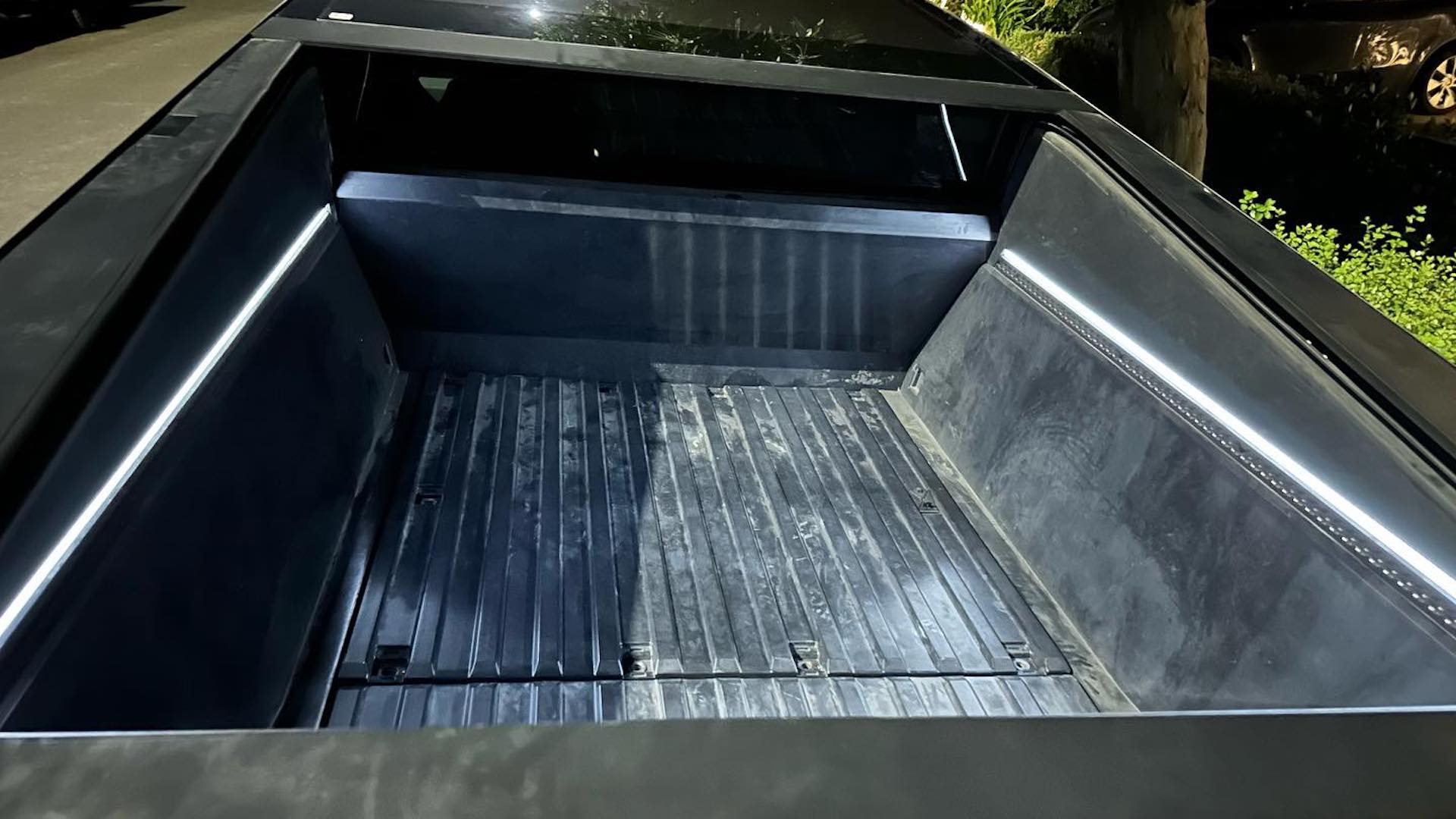

About two years behind schedule, the Tesla Cybertruck finally seems to be approaching production with prototypes out in the world. They’re giving us our first look at roadworthy examples of Tesla’s long-awaited pickup, even if that look isn’t all that flattering. One sighting even gave us photos of the bed, which features some distinct design choices that might make truck owners raise their eyebrows.
Photos of the Cybertruck’s bed were captured by Facebook user Paul Yeh, who found the Tesla pickup parked in a neighborhood. Contrary to first reports, these aren’t the production trucks, they’re pre-production—or in Silicon Valley speak, “release candidates,” or beta builds. But even from just a couple photos, we can tell that the production model’s bed will significantly differ from the concept’s.

One of the first details you’ll notice is a panel in the bed floor with bolt holes, and maybe a latch, likely covering a well for a full-size spare. Then you’ll spot the sloped bed sides, narrower at bottom than they are up top—as opposed to the concept’s vertical sides. This will limit the width of loads, or make some wide loads unstable during corners. Over-width loads could also stress the bed walls, which might be structural, though that’s not yet clear. (It could also scratch them up, as they aren’t coated in bedliner.)
It’s possible the sloped sides are lids for storage compartments, which could hide the 120- and 240-volt outlets and anticipated compressed air fitting. This might mean the cutouts at the front corners of each panel are latches, or they could just be tie-down anchors. Otherwise, the bed would appear to be without them.
Meanwhile, an element just below the lighting strips could be a hinge, as it looks too shallow to be an accessory mount rack. (It may also be structural crimping or riveting, though that’d be unusual.) That would seem to leave the Cybertruck without obvious mounts for accessories like dividers or a bed cap, though Tesla’s truck is supposed to include a motorized tonneau cover.

Another image shows the tailgate reaches armpit height on the male photographer, indicating loading the Cybertruck’s bed could be difficult. High bed wall height was one of my criticisms of the GMC Hummer EV, but it’s further complicated on this Tesla by bed walls that rise to blend into the roofline, making the tailgate the only easy place to load. Tesla has implied the rear suspension will dip for loading and unloading, but that doesn’t fully make up for the poor accessibility elsewhere.
As for those loads, the Cybertruck is expected to have a longer bed than any electric pickup on the market today at 6.5 feet. For reference, the Rivian R1T‘s bed is just 4.5 feet, the Hummer’s measures five, and the Ford F-150 Lightning‘s is 5.5-feet long. Visitors of Tesla’s Cyber Rodeo event in April 2022 also alleged that the Cybertruck featured a midgate like the Chevy Silverado EV.
It remains unclear what the Cybertruck’s payload will be, with Tesla CEO Elon Musk stating in a 2019 shareholders meeting covered by Engadget that the truck’s payload will equal or beat the F-150’s. The Lightning tops out at 2,235 pounds, while the regular F-150 reaches up to 3,325, so it’s unclear which Tesla will benchmark. Considering the Cybertruck’s heavy stainless steel bodywork though, payload ratings may be compromised.
All this said, it’s not likely to be important, as the Cybertruck was clearly designed to prioritize form over function. It’s more a novelty than a utility vehicle, closer in spirit to the Hummer than the Lightning or Silverado EV. Tesla’s still trying to make it the best of all worlds, but that’s a high bar to clear. And if it doesn’t manage, well, at least it’s supposedly amphibious and bulletproof. Supposedly.

Got a tip or question for the author? You can reach them here: james@thedrive.com
